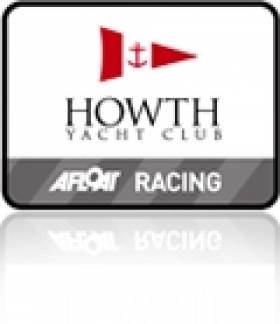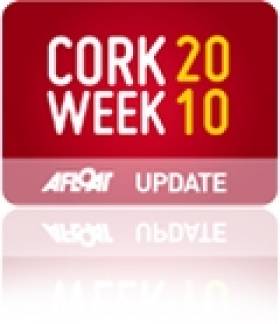Displaying items by tag: Yachting
Howth Yacht Club Launches 2011 Sailing Programme
Howth Yacht Club will launch its programme of open sailing events for 2011 at the club house tomorrow evening (Thursday 31 March).
In addition to running club sailing throughout the year, and both junior and adult sailing courses to get more involved in the sport, HYC will also be hosting more than 20 open events this year.
These are set to include local, provincial, national and international championships, which are hopes to attract visitors from all over Ireland and beyond.
For more details visit the Howth Yacht Club website at www.hyc.ie.
SB3 Sailors Cry Foul at Dun Laoghaire Parking Fees
Dissatisfaction is growing among SB3 sailors regarding the cost of parking and membership at Dun Laoghaire's top yacht clubs.
In correspondence seen by Afloat.ie, one leading sailor said that clubs "need to carefully consider their pricing policies or otherwise we are going to experience a more widespread abandonment of club sailing of SB3s".
Parking and racing fees that can top more than €2,000 per year are no longer "value for money", it is claimed, and have been blamed for membership drains as well as an increase in boat sales.
Yacht club parking fees cover the mooring and security of boats on the club's property.
Unequal treatment of boat classes has also been highlighed as an issue. One sailor said: "It strikes me as being ludicrous that we pay three times what a Flying Fifteen pays to take up not much more space."
Membership fees at Irish yacht clubs were the topic of much debate on the Afloat.ie forums last year and morte on this story HERE.
Click HERE to register and have your own say.
A leading bay sailor makes the following comment. "This is a very slanted article ignoring the fact that the SB3' s in the Royal Irish for example are dry-sailed so their costs includes craneage in and out for all their racing days. Also their fees for DBSC includes dedicated SB3 racing on Sundays. If the SB3s want to moan, let them put out the whole picture and not be selective. We consider it good value, not a rip-off. The clubs have to survive and are not out to reef sailors".
Cork Week: Cork Revealed, with Eddie English
Cork Week Revealed
with Eddie English (reprinted from Afloat 2006)
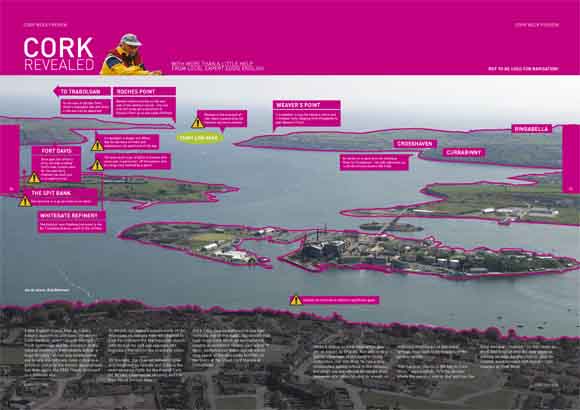
Eddie English stands high on Cobh’s historic waterfront and looks out across Cork Harbour, south towards Roche’s Point lighthouse and the entrance to the natural sailing sanctuary. Immediately below, a huge Brittany Ferries ship heads slowly out to sea; it’s not even close in size to a previous visitor to the former Queenstown, but then again, the RMS Titanic belonged to a different era.
To his left, the inshore waters north of the Whitegate oil refinery hide the channel to East Ferry where the Marlogue Inn stands over its marina and just opposite, the legendary Murphs on the mainland shore.
On his right, the channel between Spike and Haulbowline Islands and Cobh is the main shipping route for the Port of Cork for ferries, commercial shipping and the Irish Naval Service base.
But it’s the view straight out to sea that confirms one of the magic ingredients that have made Cork Week an international regatta of worldwide repute: vast tracts of open, unobstructed water and all within easy reach of the shoreside facilities of the hosts at the Royal Cork Marina at Crosshaven.
When it comes to local knowledge, few are as expert as English. Not only is he a former chairman of the event's racing committee, not only does he run a long-established sailing school in the harbour, but when you are offered an insight from someone who takes his dog for a walk on notorious mud banks at low water springs, they tend to be nuggets of the golden variety.
"The harbour course is the key to Cork Week," says English. "It's the decider where the event is won or lost and has the most variables involved." So this, then, is the Eddie English step-by-step guide to gaining an edge for that course, plus the coastal, wind/leeward and Olympic-type courses at Cork Week.
COPYRIGHT – AFLOAT MAGAZINE 2006
Cork Week Uncovered: Who Will Be There
Cork Week Uncovered: Who Will Be There
From Afloat, July 2006
Cork Week's not all about rubbing shoulders with serious money but, having that said, there will be more millionaires on the banks of the Currabinny river between July 10 and 16 than sails in the harbour. Crosshaven will teem with sailors and supporters for a festival of sailing that’s more like Galway Races on water than a regular sailing regatta.
And that's the reason it’s become so popular with foreigners, attracting 80 per cent of its competitors from overseas.
Pyewacket and Morning Glory may be the big glamour boats but the entry list has 499 other boats as well, the bulk of which are from the UK visitors. Up to 7,000 competitors will take to the water each morning, bringing an estimated 10 million euro into the local economy. That may be small beer to the likes of Roy Disney but in sporting terms it's like having the commercial return of an international rugby fixture in an otherwise sleepy fishing village.
Seven bars, three restaurants, 50 bands, 400 performers and 180 hours of entertainment are ready to serve competitors from as far away as the US, Hong Kong, Australia, France, Germany and Belgium along with a huge representation from England, Scotland and Wales.
On the water the fleets are split over eight different courses according to size of boat. Sailors are categorised too and part of the charm of the race week is that the majority of racing classes prohibit sailing professionals as crew.
Warrenpoint Harbour Authority
Warrenpoint Harbour Authority
Warrenpoint Harbour Authority seeks to operate profitably within fair and competitive tariff arrangements so that the Port is economically sustainable. Its aim is to contribute as much as possible to the generation of economic wealth within the Port and its regional hinterland.
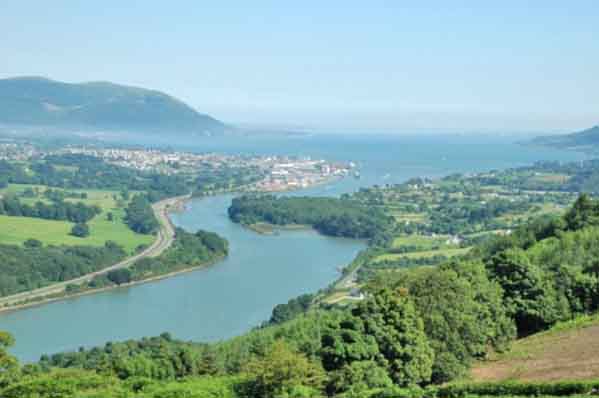
Consequently, profit optimisation, to achieve its primary mission rather than profit maximisation, will be pursued.
History
The original Port of Warrenpoint, consisting of a wet dock and piers, was constructed in the late 1770s by Roger Hall, Robert Ross and Isaac Corry with the assistance of £500 of public funds. In 1919 the heirs of Roger Hall sold the Port to John Kelly and Sons for the sum of £16,000. John Kelly continued to operate the Port until 1971 when it was sold to Warrenpoint Harbour Authority for £369,000.
The Port was substantially enlarged with an initial total investment of approximately £6.7million to create the modern Port of Warrenpoint. Until 1971 the Port of Warrenpoint acted as a lightering port for the Port of Newry and jointly these ports handled approximately half a million tonnes of cargo annually. Subsequently the modern Port of Warrenpoint has handled 5 times as much cargo on an annual basis.
Warrenpoint Harbour Authority, The Docks, Warrenpoint, Co. Down, N. Ireland BT34 3JR. Administration/General Enquiries – Tel: 028 417 73381 • Fax: 028 417 52875. Operations – Tel: 028 417 52878 • Fax: 028 417 73962• Email: [email protected]
Howth Harbour
Howth Harbour
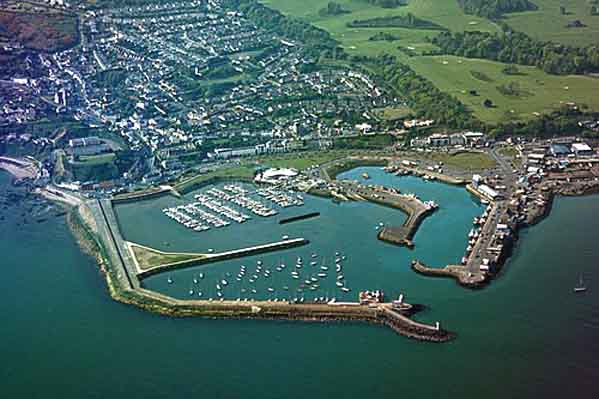
A picturesque fishing village nestled on the rugged peninsula that forms the north side of Dublin Bay, Howth is one of Ireland’s many hidden treasures. That is not to say that the village doesn’t receive its fair share of visitors. Far from it. Howth is a favourite holiday destination and benefits especially from its popularity amongst yachtsmen and pleasure boaters. Indeed Howth Yacht Club dates back to 1895 and with around 2,000 members it is by far the largest in the country and enjoys a busy programme of racing, regattas and voyaging. The marina and club complex combine state of the art with old and traditional with standards of services superb across the board. As you would expect from such a large club, berths are plentiful and marine services top notch.
Away from the harbour itself there is much to recommend Howth. Historians will love the ruined abbey, nearby Baily Lighthouse and 15th century castle. You can take a bracing stroll along the piers, sight-see aboard an open top tram, watch seals and dolphins in the waters along the shore and take in breathtaking views from cliff top walks. Of course, Howth’s working fishing port means that fish and seafood lovers are absolutely spoilt when it comes to dining out and the pub scene is second only to Dublin itself, if a little more relaxing.
Howth is a lovely place from which to discover Ireland. You can blow away the cobwebs and kick back and explore the magnificent coastline at your leisure knowing you will be returning after each trip to one of the friendliest places on earth. And that’s the truth.
Marine Services in Howth – click here
Pilot Notes for Howth – click here
Marinas in Howth – click here
Accommodation in Howth – click here
Emergency
Fire/Ambulance/Police: 999/112
Customs: 874 6571
Harbour Master: 83 222 52
Lifeboat: 8323 524
Beaumont Hospital: 83 777 55
Tourist Information – Fingal Tourist Information Office +353 1839 6955
Air Travel
Aer Lingus: 705 3333
British Midland: 283 8833
RyanAir Flight Information: 1550 200200
CityJet: 844 5566
Car Ferries
Stena Line: 204 7777
Irish Ferries: 66 10 511
Rail Transport – Iarnrod Eireann (Irish Rail): 83 66 222
Howth Harbour Harbour Master's Office – Captain Raja Maitra, tel +353 (0) 1 83 222 52 or mobile 086 3814926. fax +353 (0) 1 832 6948 (Office situated Northern End of Auction Hall)
Waterford Harbour (Dunmore East) Sailing Club
Waterford Harbour (Dunmore East) Sailing Club
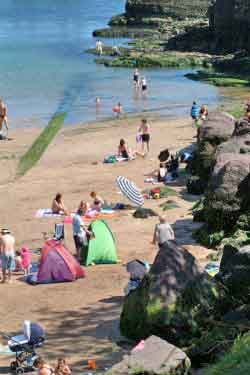 Founded in 1934 this is a family club with around 200 members. The clubhouse was extensively renovated in 2004. Visitors are most welcome and a limited number of visitor berths are available. Showers and toilets are also available to visitors in the summer. The clubhouse, with bar and snack meals, is open daily in the summer and at weekends during the winter. ISA Junior training courses and powerboat courses take place from late June until mid-August. Yachtmaster Coastal and Offshore shorebased courses are available during the winter.
Founded in 1934 this is a family club with around 200 members. The clubhouse was extensively renovated in 2004. Visitors are most welcome and a limited number of visitor berths are available. Showers and toilets are also available to visitors in the summer. The clubhouse, with bar and snack meals, is open daily in the summer and at weekends during the winter. ISA Junior training courses and powerboat courses take place from late June until mid-August. Yachtmaster Coastal and Offshore shorebased courses are available during the winter.
Left: The beach at Dunmore East
COURSES OFFERED – Dinghy: Up to Improving Skills, Advanced Boat Handling, Racing 1, Kites & Wires 1, Adventure 1. Power Boat: 1, 2 and Safety Boat. Cruising Shorebased: Yachtmaster Coastal and Offshore
Waterford Harbour (Dunmore East) Sailing Club, c/o Derry O'Sullivan, The Harbour, Dunmore East, Co Waterford. Tel: 051 383389 and 383230, email: [email protected]
Have we got your club details? Click here to get involved
Sailing and Boating Holidays in Ireland
Whether you want to learn to sail, are already an experienced sailor and want to cruise the canals, or feel like touring around the coast, our Island of Ireland can accommodate you.
PAGE UNDER CONSTRUCTION ;-)
Winterising Your Boat
Winterising Your Boat
The whole idea of winterisation can be about as appealing as having a tooth filled – and possibly as expensive – but there’s no substitute for being prepared, and a reluctance to cough up the necessary budget can be a false economy in the long run.
Of course, winterisation is not a word that will stir much enthusiasm in the breast of the average boat-owner, bringing home the fact that summer is over and the evenings will now close in with unprecedented speed.
However, the W-word could be quite painless, even fun, if you are into that sort of thing. And most sailors love their boats – it being a source of pride and pleasure – and want to keep them in top condition.
This Afloat guide to winterising your boat (see menu on right hand side of page) will steer you towards those who can do the job for you, or at least give you useful advice so that you don’t end up standing in the dark, cold, wet, and frustrated, with oil on your clothes and an engine strewn all over the driveway.
It may be true that in the depths of winter lies an invincible summer.
Sailing in Dublin Club (SID)
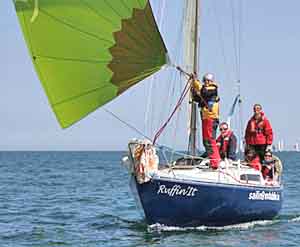 Ruffin'It taking part in the 2008 Lambay Race, June 2008. Standing: Martina, Peter and Daniel, and sitting: Carlos and Mags
Ruffin'It taking part in the 2008 Lambay Race, June 2008. Standing: Martina, Peter and Daniel, and sitting: Carlos and Mags
Sailing In Dublin Club (SID)
Sailing in Dublin Club (SID) is a small friendly club based in Dun Laoghaire, Co. Dublin.
Founded thirty years ago, the Club offers the opportunity of sailing regularly without having
to buy a boat. SID provides a fleet of dinghies and three yachts for sailing activities -
including racing and cruising – for a very competitive and affordable membership
subscription fee. The club welcomes adults who wish to enjoy sailing in Dublin Bay and
beyond.
If you are a beginner, you can sail on the club's 33ft Sigma and 23ft Ruffian keelboats with
experienced crew to build up your sailing skills and knowledge. If you have some sailing
experience, you can spend more time on the water dinghy sailing, on SID's 35ft cruising boat
Silver Wind, or on our keelboats where you can take part in all aspects of sailing, from
crewing to helming to navigation. SID gives you the opportunity of sailing with more
experienced sailors to build on sail training courses you may have taken elsewhere, or
perhaps before committing yourself to buying a boat.
Along with day sails in Dublin Bay and cruises further afield, all members are encouraged to
take part in races and regattas held in Dun Laoghaire during the summer months and the
'frostbite' series held on Sundays during the winter. Reflective of the club's voluntary ethos,
members take part in all aspects of running and organising the club and help with boat
maintenance. Boats, rescue cover and safety equipment are provided. Guest sails with the
club are available for those wishing to see what the club has to offer before joining as a full
member. The cost of a guest sail is redeemable against the full membership fee.
Regular weekend dinghy and yacht day sails and races continue over winter months subject
to suitable weather conditions. Club members are also encouraged to up-skill by
participating in on-shore training courses, attending talks. There are also opportunities for
socialising after sails as well as through Club dinners and other social events.
Club membership runs from January 1st to December 31st. In 2015 the annual membership
fee is €370. For details of any special offers throughout the year keep an eye on the Club's
website.
Further information on Sailing in Dublin Club and details of how to join can be found by
going to www.sailingindublin.ie or by contacting the SID Membership Secretary, Email:
www.facebook.com/sailingindublin


























